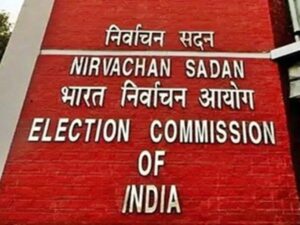GS2 – Polity

Context
The Opposition has accused the Election Commission of India (ECI) of large-scale irregularities in electoral rolls in Karnataka, Maharashtra, and other states, alleging systematic bias and “vote theft” in favour of the ruling party.
Election Commission of India (ECI)
Nature & Establishment
- Type: Constitutional, autonomous body for conducting free and fair elections in India.
- Established: 25 January 1950.
- Headquarters: New Delhi.
Constitutional Provisions
- Article 324: Grants the ECI power over the superintendence, direction, and control of elections.
- Articles 325–329: Deal with electoral rolls, universal adult suffrage, legislative powers over elections, and judicial limitations.
Structure
- Comprises Chief Election Commissioner (CEC) and two Election Commissioners.
- Appointment: By the President of India.
- Tenure: 6 years or until 65 years of age, whichever is earlier.
Powers & Functions
Administrative:
- Delimitation of constituencies.
- Preparation and revision of electoral rolls.
- Recognition of political parties.
- Allocation of election symbols.
- Enforcement of the Model Code of Conduct.
Quasi-Judicial:
- Resolving party splits/mergers.
- Deciding on disqualification of members.
- Monitoring election expenditure.
Advisory:
- Advising the President or Governor on disqualification matters and corrupt practices.
Major Allegations in Voter Roll Irregularities
- Duplicate Voter Entries
- Over 11,900 cases of multiple entries in the same constituency.
- Example: One individual listed in four polling booths.
- Fake or Invalid Addresses
- Around 40,000 entries with non-existent or unverifiable addresses.
- Example: Father’s name fields with random characters indicating poor verification.
- Bulk Registration at a Single Address
- Dozens of unrelated voters registered at the same small residence.
- Example: One-room house with 80 voters from different families.
- Commercial Premises Used as Residences
- Voter registrations at business locations instead of actual homes.
- Example: Brewery address with 68 registered voters, none residing there.
- Misuse of Form 6 (New Voter Registration)
- Cases of repeat or ineligible entries using forms meant for first-time voters.
- Example: Elderly voter registered twice within two months and voting in different booths.
- Multiple-State Enrolment
- Same individuals registered in more than one state.
- Example: One person’s name found in voter lists of three states.
- Wider Pattern Across States
- Similar irregularities detected in multiple constituencies and states.
- Example: In one election, disputed entries matched the winning margin.
Significance of Elections in a Democracy
- Legitimacy of Governance: Provides authority through people’s mandate (e.g., 67% voter turnout in 2019).
- Citizen Empowerment: Upholds universal adult suffrage under Article 326.
- Political Stability: Enables smooth power transitions and prevents unrest.
- Rule of Law: Reinforces constitutional morality and accountability.
Way Forward
- Digital Transparency:
- Publish voter rolls in machine-readable formats for public scrutiny to detect duplication and errors.
- Third-Party Audits:
- Independent verification by neutral agencies to ensure accuracy and impartiality of electoral rolls.
- Legal Reforms:
- Amend the Representation of the People Act, 1951 to introduce stricter penalties for voter fraud and ensure quick action.
- Public Confidence Measures:
- Regular briefings on complaint status and resolution to enhance transparency and trust.
- Technology Integration:
- Explore blockchain-based voting systems for tamper-proof, transparent, and secure digital elections.




